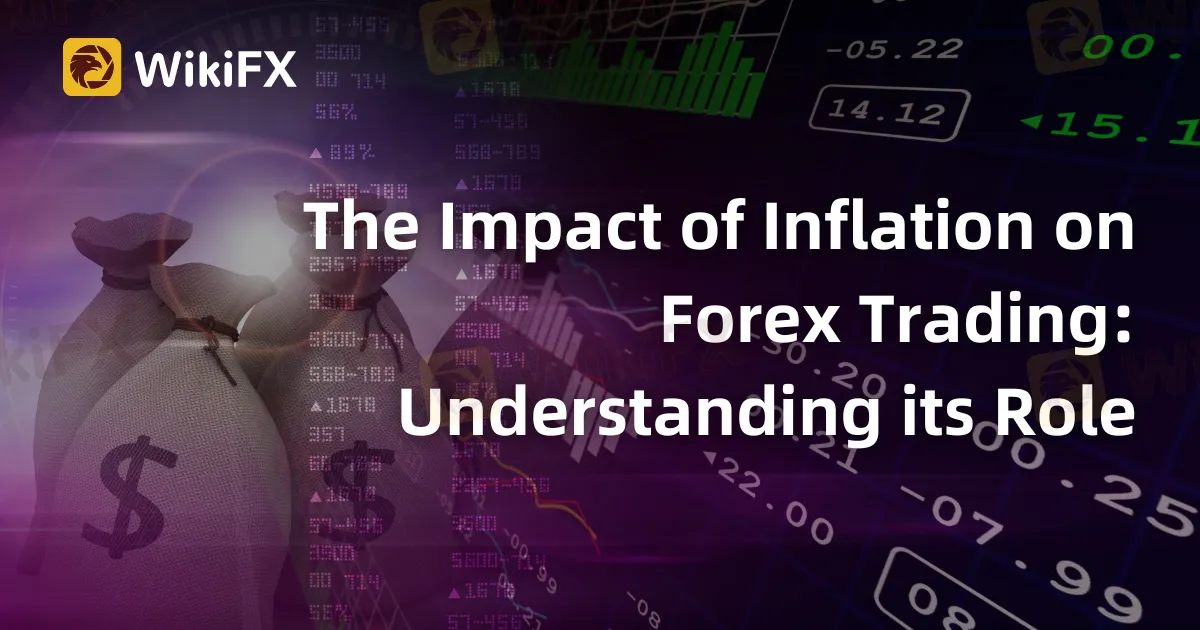Saracen Markets Review: Regulated or Scam Alert?
Saracen Markets claims “regulated,” but serious red flags suggest scam risk—see what to verify before depositing. Read our Saracen Markets review and scam alert now.
简体中文
繁體中文
English
Pусский
日本語
ภาษาไทย
Tiếng Việt
Bahasa Indonesia
Español
हिन्दी
Filippiiniläinen
Français
Deutsch
Português
Türkçe
한국어
العربية
Abstract:Inflation is the rate at which the general price level of goods and services in an economy rises over time. In this article, we will discuss the role of inflation in forex trading.

Forex trading, or foreign exchange trading, is the buying and selling of currencies in the global financial market. One of the most significant factors that affect forex trading is inflation. Inflation is the rate at which the general price level of goods and services in an economy rises over time. In this article, we will discuss the role of inflation in forex trading.
Inflation affects forex trading in two primary ways: it influences the value of a currency in the global market, and it affects the monetary policy of a country. Let's take a closer look at each of these factors.
First, inflation affects the value of a currency in the global market. A country with a high inflation rate typically has a currency that is weaker relative to other currencies. This is because when there is a high inflation rate, the purchasing power of that currency decreases. For example, if a country's inflation rate is 10%, then the cost of goods and services in that country will increase by 10% each year. As a result, the currency's value decreases, and the exchange rate between that currency and other currencies will be affected.






On the other hand, a country with a low inflation rate typically has a stronger currency. This is because the purchasing power of the currency remains relatively stable over time, which makes it more attractive to investors. In forex trading, traders will look at a country's inflation rate as an indicator of the country's economic health. A high inflation rate may signal that the economy is struggling, while a low inflation rate may indicate that the economy is strong.
Second, inflation affects the monetary policy of a country. Central banks use monetary policy to control inflation and stabilize the economy. When inflation is high, central banks may raise interest rates to reduce the money supply and cool down the economy. This is because high inflation can lead to hyperinflation, which can have devastating effects on the economy. Hyperinflation can lead to a rapid decrease in the value of a currency, which can make it difficult for businesses and consumers to purchase goods and services.
When central banks raise interest rates, it can make a country's currency more attractive to foreign investors. This is because higher interest rates can provide a better return on investment. As a result, the demand for that currency may increase, which can increase its value relative to other currencies. On the other hand, when central banks lower interest rates, it can make a country's currency less attractive to foreign investors. This is because lower interest rates can provide a lower return on investment, which can decrease the demand for that currency and decrease its value relative to other currencies.
In conclusion, inflation plays a critical role in forex trading. It affects the value of a currency in the global market and the monetary policy of a country. Forex traders need to monitor inflation rates to determine the strength of a country's economy and the potential impact on currency values. As a forex trader, it is important to stay up-to-date with the latest news and economic indicators to make informed trading decisions. By understanding the role of inflation in forex trading, traders can develop effective trading strategies that take into account the impact of inflation on currency values.
Install the WikiFX App on your smartphone to stay updated on the latest news.
Download link: https://www.wikifx.com/en/download.html?source=fma3

Disclaimer:
The views in this article only represent the author's personal views, and do not constitute investment advice on this platform. This platform does not guarantee the accuracy, completeness and timeliness of the information in the article, and will not be liable for any loss caused by the use of or reliance on the information in the article.

Saracen Markets claims “regulated,” but serious red flags suggest scam risk—see what to verify before depositing. Read our Saracen Markets review and scam alert now.

FXRoad exposure review: withdrawal red flags, offshore status, and safety risks explained. Learn what to watch for and how to protect your funds—read now.

When people who invest ask, "Is Arena Capitals safe or a scam?" the proof shows we need to be very careful. This broker works without proper rules from top financial authorities, gets very low safety scores from independent financial watchdogs, and many users have serious complaints about them. The information available to everyone suggests that giving your capital to this company could lead to losing it all. This analysis doesn't guess - it looks at these important warning signs. We will look at real facts, study actual user reviews that show big problems with taking out funds, and give a clear answer based on evidence about whether Arena Capitals can be trusted. This article gives you the facts you need to make a smart choice and keep your funds safe from an unregulated, high-risk business.

When traders are choosing a brokerage, the most important questions are always about safety and whether the company is legitimate. When it comes to Arena Capitals, the verdict is clear and immediate based on extensive public data and regulatory checks. This company operates without oversight from any top-tier financial authority, putting it firmly in the high-risk category. Our analysis shows a consistent pattern of warning signs that potential investors must consider. The key findings are clear: verification platforms mark Arena Capitals with a "No Regulation" status, its company registration is in an offshore location known for its lack of financial oversight, and a growing number of user reports detail significant problems, especially with withdrawing funds. This article provides a complete, evidence-based breakdown of these facts to help you make an informed decision and protect your capital. The conclusion is that Arena Capitals presents a high potential risk to investors.
